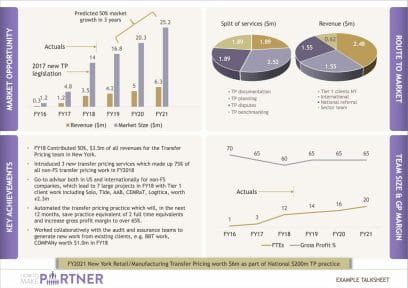Over the last few years, a few of my clients have been rejected at the final hurdle for partner. Often through no direct fault of their own. In this blog post, I examine 3 reasons why your very strong Business Case for partnership was not enough to make partner this time around.
Firm politics
This scenario was with an absolute slam dunk of a Business Case for partnership for a large well-known city law firm. It was well thought out and based on a partner retiring in the next 12 months. The candidate was winning work regularly, well regarded in the marketplace, and already seen as a partner. The firm would have been mad not to make her formally up to partner. However, firm politics got in the way. And, boy, did they get in the way. The wider department the candidate was in was struggling. Market conditions were tough, and there was no guarantee that they would pick up. Even though my client’s Business Case was not reliant on market conditions picking up, they still rejected her. They rejected her for purely political reasons. I.e. they couldn’t be seen admitting a new partner in an area of the firm that was struggling to hit the target.
It came to light that there was more to this scenario than first realised. Yes, there was a partner retiring. It turned out that the partner had arranged for many of his clients to be managed by the 2 other male senior associates in the department. My client was being ‘strung’ along by this retiring partner to keep her sweet. This, in effect, sabotaged my clients’ Business Case for partnership. This type of thing doesn’t happen that often. But if your firm is very ‘political’ (often the preserve of law firms and consultancy firms), then be aware that this could happen.
If you think this could happen to you, ensure you have many advocates for your Partner Business Case from many partners. Not just the partner that you work with closely.
Your takeaway: Remember it may not be you that’s the problem; it may be the others around you.
If you are concerned that your Business Case for partnership needs to be stronger, then download our FREE Guide to Creating A Cast-Iron Business Case for partnership. This guide contains a suggested structure and format for your Business Case and draws heavily on the information contained in the Business Case Chapter in Poised for Partnership.
The firm wasn’t having a good year
When we put together my client’s Business Case, we knew that there were a few weaknesses. Of course, we did our best to put a positive spin on his Partner Business Case. However, the firm globally was going through a tough time. Profits were down. As a result, the firm admitted far fewer new partners than in previous years. My client was told that his Business Case would have probably been enough in a good year to get him through to partnership. But this time around, there were stronger Business Cases out there which were prioritised.
Every year the partners in your firm will decide on the number of new partners they can admit that year. The number is often capped, and there is no leeway to admit more than this number. This means although you are told to work collegiately, and we are one firm, when it comes to your Business Case for Partnership, you are in competition with the other directors and senior associates going for partnership.
With many global law firms being only a few different firms but spread across many offices in many countries, this happens often. I.e., you are up against other senior associates, senior counsel, or legal directors in other countries. For example, if the Asian part of your law firm is having a difficult time, this will likely reduce the number of new partners the firm will make up across the whole firm. This is why it is essential to spend time a year or so before you want to make partner meeting partners in other service lines, offices and countries. These partners need to know about you and support your Business Case for partnership. You can’t just rely on your small part of the firm advocating for you and your Business Case. Your mentor should be able to help you identify which partners you need to talk to about your Partner Business Case.
 A tool that you can use to help you talk to other partners about your Partner Business Case is a Talk Sheet. This is a simple one-page document that normally includes some visuals and a small bit of text.
A tool that you can use to help you talk to other partners about your Partner Business Case is a Talk Sheet. This is a simple one-page document that normally includes some visuals and a small bit of text.
See on the left for an example of a Talk Sheet. The power of a Talk Sheet is it makes your Business Case for partnership very simple and easy to grasp. Even for those partners who don’t reside in your country OR work in your service line.
This professionally designed Talk Sheet Template is just one of the resources in our Progress to Partner membership site. To save time creating your own Talk Sheet, download this resource (for free) here.
Your takeaway: Remember that if the firm is having a lean time your Business Case for partnership will need to be exceptionally strong to be accepted.
f you are concerned that your Business Case for partnership needs to be stronger, then download our FREE Guide to Creating A Cast-Iron Business Case for partnership. This guide contains a suggested structure and format for your Business Case and draws heavily on the information contained in the Business Case Chapter in Poised for Partnership.
Your takeaway: Remember that the process for getting your Partner Business Case agreed upon starts before the formal Partnership Admissions Process starts.
Not a practice lead – yet!
This was a strange one. My client had an exceptionally strong Business Case for her Big 4 firm. I had a really good feeling about this one. Her Business Case was a good strategic fit, and she easily hit partner numbers. The department and firm wanted to invest in this area and needed another partner to sustain the team’s growth. It looked like a shoe-in. Unfortunately, her Business Case was “deferred” as there was another partner in her team, and she wasn’t a practice lead. Seriously!!! As a result, the partner has been moved sideways, and she’s been given a year to prove herself as a practice lead before being made up to partner.
Your takeaway: Even with a good Business Case for partnership nothing is guaranteed in a partnership.
What’s in Progress To Partner which will help you with your Business Case for partner?
Progress to Partner is our membership site that will give your the knowledge AND confidence to fly through this final step up to partner.
It’s like a Netflix for your career in the professions. Find what you need to watch or read at the time you need it. Within the site, you’ll find over 150+ courses, videos, checklists, templates and plans to help you progress your career to partner. Amongst the many curated resources (no more unnecessary scrolling or searching), you’ll find:
- On-demand courses on how to create and articulate your business case, including our most downloaded course “How to Build a Cast-Iron Business Case for Partner”
- A section on the Partnership Admissions process with guides and recordings to help you find your way through the process with your sanity intact.
- Recordings and checklists on how to ace your partner panel interview
- On-demand courses on how to win the right sort of clients
- Proven advice on how to still do the day job and find the time to get through the Partner Track process








